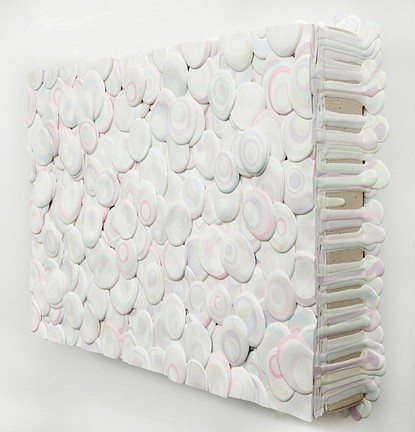PRESS RELEASE

An exhibition of works by 21 artists, co-curated by Erin Brown and Margaret Thatcher. The exhibition, which includes work in a wide range of media from artists both represented in the gallery’s stable and guest artists, explores the visual and ideological possibilities of the color white.
When approached as a conscious choice, white becomes a means of exploration and dialogue, rather than the self-erasing byproduct of margins and borders. Freed from the reaches of negative space, it functions as an active agent in expressing abstract concepts and emotions, enabling the viewer to re-evaluate surface, location in space and the interplay between actor and object. In w h i t e-h o t, we see how each artist has embraced white not merely as an end, but as a unique means to communicate a specific, abstract idea.
This teleological notion takes root in William Steiger’s whitewashed collages, where white serves as both highlight and shadow; in the expressive lines of Adam Fowler’s cut paper drawings which give the sense of a remnant of something that once was present and now is not; and in the tones and recessed surfaces of a vibrant painting by Rainer Gross, where white is added and removed from two canvases as the pieces are pressed together to form twin paintings. Analia Saban gives white a grave sense of weight as cast encaustic hangs from her canvas while Joie Rosen utilizes white for its weightless ethereal qualities by creating indiscernible depths in layers of acrylic, silk and wood. The cold, impersonal fragility of Susan Graham’s dainty ceramic derringer finds contrast in the earthy warmth of a paper glove by Aric Obrosey.
White becomes the color of meditation in a mandala-esque painting by Barbara Takenaga and a cut paper object by Jaq Belcherbased in deviant geometry. It is the pallor of the recluse in Bill Thompson’s haunting wall sculpture, and the bleached wash of the blinding desert in a multi-fragmented piece by Carlos Estrada-Vega.
Broad in its scope, w h i t e-h o t aims to engage the viewer in a lively visual discussion of the implications and impact of the color through which we see everything else.
